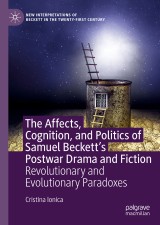Details

The Affects, Cognition, and Politics of Samuel Beckett's Postwar Drama and Fiction
Revolutionary and Evolutionary ParadoxesNew Interpretations of Beckett in the Twenty-First Century
|
CHF 94.50 |
|
| Verlag: | Palgrave Macmillan |
| Format: | |
| Veröffentl.: | 21.01.2020 |
| ISBN/EAN: | 9783030349028 |
| Sprache: | englisch |
Dieses eBook enthält ein Wasserzeichen.
Beschreibungen
<p><i>The Affects, Cognition, and Politics of Samuel Beckett’s Postwar Drama and Fiction: Revolutionary and Evolutionary Paradoxes </i>theorizes the revolutionary and evolutionary import of Beckett’s works in a global context defined by increasingly ubiquitous and insidious mechanisms of capture, exploitation, and repression, alongside unprecedented demands for high-volume information-processing and connectivity. Part I shows that, in generating consistent flows of solidarity-based angry laughter, Beckett’s works sabotage coercive couplings of the subject to social machines by translating subordination and repression into <i>processes </i>rather than <i>data</i> of experience. Through an examination of Beckett’s attack on gender/ class-related normative injunctions, the book shows that Beckett’s works can generate solidarity and action-oriented affects in readers/ spectators regardless of their training in textual analysis. Part II proposes that Beckett’s works can weaken the cognitivedominance of constrictive “frames” in readers/ audiences, so that toxic ideological formations such as the association of safety and comfort with simplicity and “sameness” are rejected and more complex cognitive operations are welcomed instead—a process that bolsters the mind’s ability to operate at ease with increasingly complex, malleable, extensible, and inclusive frames, as well as with increasing volumes of information.</p>
<div><div>1. Introduction to Beckett’s “Absurdist” Excess.- Part I Contagion and Accessibility: Revolutionary Beckett.- 2. Repetition, Deliberation, and an <i>Other</i> Power: The Paradox as Practice.- 3. The Liberating Laughter of “Nearly There”: Beckett’s Solidarity-Building Dramas.- 4. Under-the-Radar Derision and Anger: Becoming Revolutionary in/ through Beckett’s Fiction.- Part II Script Evaluation and Enrichment: Evolutionary Beckett.- 5. Beckett’s “Script Multiplication and Enrichment”: Rejecting Toxic Disjunctions and Seeking Inclusivity.- 6. Evaluation, Expulsion, Expansion, and Reframing: Building Processing Speed and Tolerance to Cognitive Strain.- 7. Conclusion.</div></div><div><br></div>
<p></p><p><b>Cristina Ionica</b> teaches English, Film, Writing, and Professional Communication courses at Fanshawe College in London, Canada. Her research has been published in <i>ESC: English Studies in Canada</i>, <i>Angelaki: Journal of the Theoretical Humanities</i>, <i>MLS: Modern Language Studies</i>,<i> Critique: Studies in Contemporary Fiction</i>, <i>LIT: Literature Interpretation Theory</i>, and <i>Horror Studies</i>.</p>
<p> </p><br><p></p>
<p> </p><br><p></p>
<p><i>The Affects, Cognition, and Politics of Samuel Beckett’s Postwar Drama and Fiction: Revolutionary and Evolutionary Paradoxes </i>theorizes the revolutionary and evolutionary import of Beckett’s works in a global context defined by increasingly ubiquitous and insidious mechanisms of capture, exploitation, and repression, alongside unprecedented demands for high-volume information-processing and connectivity. Part I shows that, in generating consistent flows of solidarity-based angry laughter, Beckett’s works sabotage coercive couplings of the subject to social machines by translating subordination and repression into <i>processes </i>rather than <i>data</i> of experience. Through an examination of Beckett’s attack on gender/ class-related normative injunctions, the book shows that Beckett’s works can generate solidarity and action-oriented affects in readers/ spectators regardless of their training in textual analysis. Part II proposes that Beckett’s works can weaken the cognitivedominance of constrictive “frames” in readers/ audiences, so that toxic ideological formations such as the association of safety and comfort with simplicity and “sameness” are rejected and more complex cognitive operations are welcomed instead—a process that bolsters the mind’s ability to operate at ease with increasingly complex, malleable, extensible, and inclusive frames, as well as with increasing volumes of information.</p>
Draws on political theory, affect theory, and cognitive literary theory Explicates the positive and paradoxical role of humor and anger in Beckett’s work Highlights the linguistic and intertextual complexity of Beckett’s work and responses to his work
Diese Produkte könnten Sie auch interessieren:

The Enigma of Good and Evil: The Moral Sentiment in Literature

von: Anna-Teresa Tymieniecka

CHF 354.00















